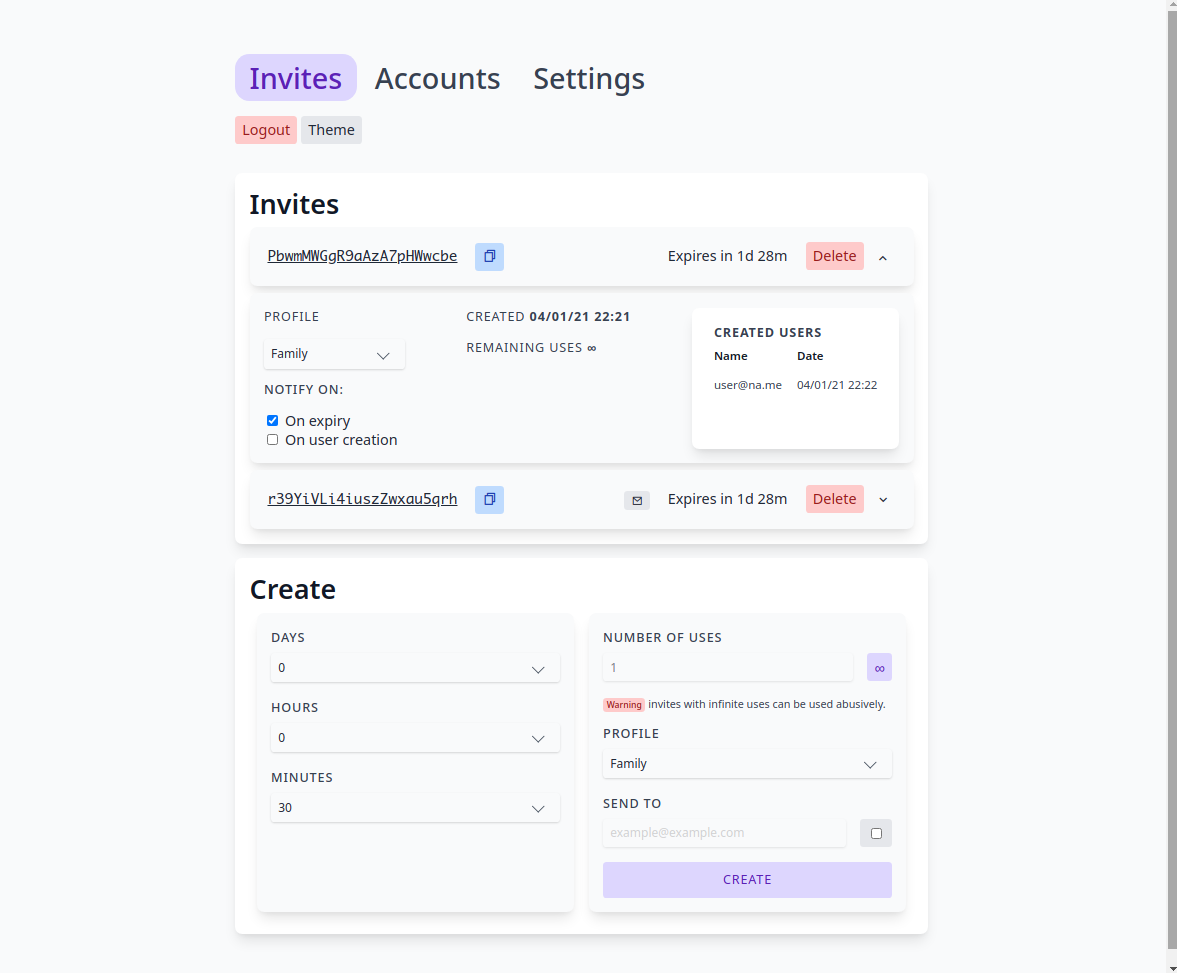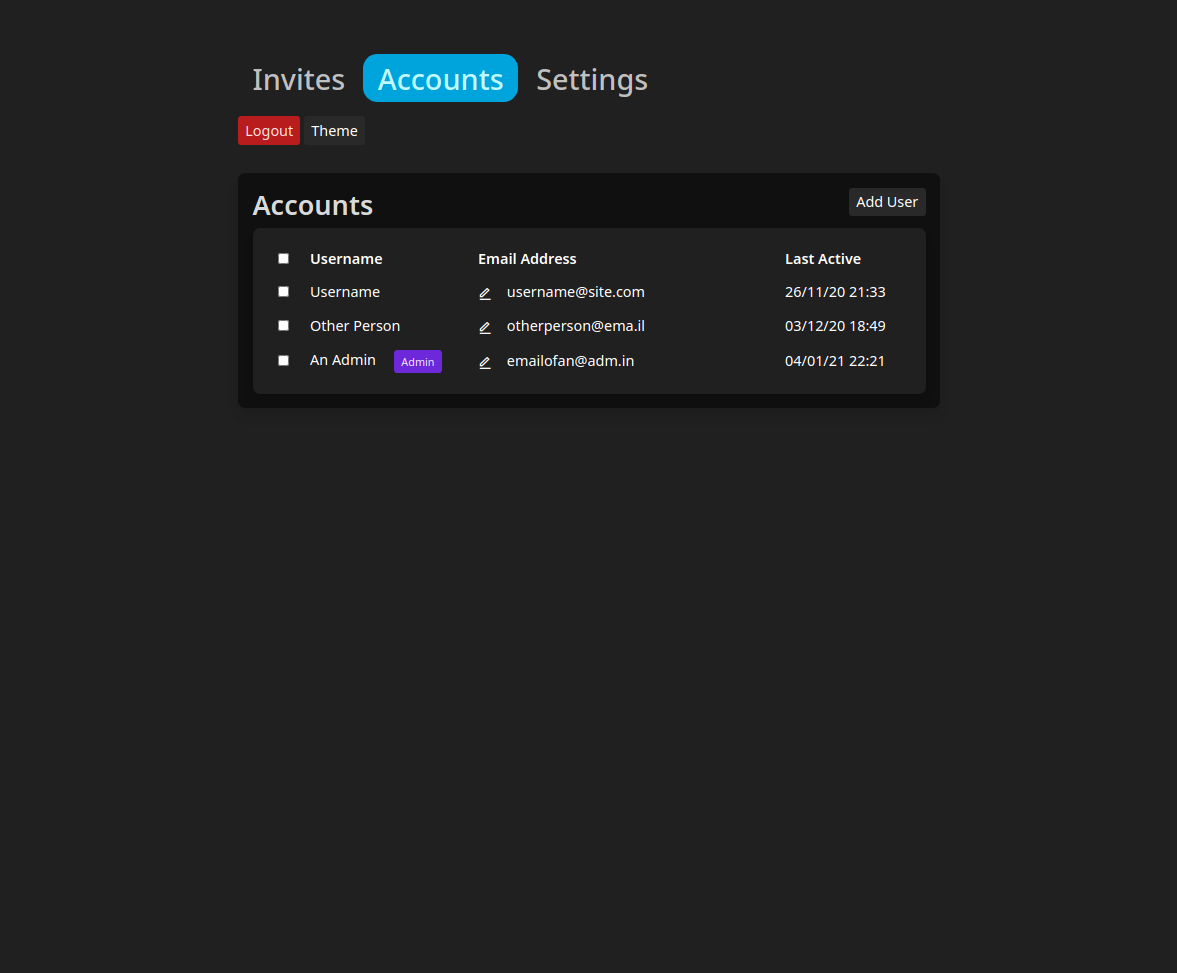GOBINARY defaults to "go", but if you want to build on a normal system, you'll likely set it to go1.16rc1 with "make all GOBINARY=go1.16rc1". |
||
|---|---|---|
| .github | ||
| common | ||
| config | ||
| css | ||
| docs | ||
| html | ||
| images | ||
| lang | ||
| mediabrowser | ||
| ombi | ||
| static | ||
| ts | ||
| .drone.yml | ||
| .gitignore | ||
| .goreleaser.yml | ||
| api.go | ||
| auth.go | ||
| config.go | ||
| CONTRIBUTING.md | ||
| daemon.go | ||
| Dockerfile | ||
| email.go | ||
| embed.py | ||
| go.mod | ||
| go.sum | ||
| lang.go | ||
| LICENSE | ||
| main.go | ||
| Makefile | ||
| models.go | ||
| package-lock.json | ||
| package.json | ||
| pwreset.go | ||
| pwval.go | ||
| README.md | ||
| setup.go | ||
| static.go | ||
| storage.go | ||
| version.py | ||
| views.go | ||
jfa-go is a user management app for Jellyfin (and now Emby) that provides invite-based account creation as well as other features that make one's instance much easier to manage.
I chose to rewrite the python jellyfin-accounts in Go mainly as a learning experience, but also to slightly improve speeds and efficiency.
Features
- 🧑 Invite based account creation: Sends invites to your friends or family, and let them choose their own username and password without relying on you.
- Send invites via a link and/or email
- Granular control over invites: Validity period as well as number of uses can be specified.
- Account profiles: Assign settings profiles to invites so new users have your predefined permissions, homescreen layout, etc. applied to their account on creation.
- Password validation: Ensure users choose a strong password.
- 🔗 Ombi Integration: Automatically creates Ombi accounts for new users using their email address and login details, and your own defined set of permissions.
- Account management: Apply settings to your users individually or en masse, and delete users, optionally sending them an email notification with a reason.
- 📨 Email storage: Add your existing users email addresses through the UI, and jfa-go will ask new users for them on account creation.
- Email addresses can optionally be used instead of usernames
- 🔑 Password resets: When user's forget their passwords and request a change in Jellyfin, jfa-go reads the PIN from the created file and sends it straight to the user via email.
- Notifications: Get notified when someone creates an account, or an invite expires.
- Authentication via Jellyfin: Instead of using separate credentials for jfa-go and Jellyfin, jfa-go can use it as the authentication provider.
- Enables the usage of jfa-go by multiple people
- 🌓 Customizable look
- Specify contact and help messages to appear in emails and pages
- Light and dark themes available
Interface
Install
Available on the AUR as jfa-go or jfa-go-git.
For other platforms, grab an archive from the release section for your platform (or nightly builds here), and extract jfa-go and data to the same directory.
- For linux users, you can place them inside
/opt/jfa-goand then runsudo ln -s /opt/jfa-go/jfa-go /usr/bin/jfa-goto place it in your PATH.
Run the executable to start.
For docker, run:
docker create \
--name "jfa-go" \ # Whatever you want to name it
-p 8056:8056 \
# -p 8057:8057 if using tls
-v /path/to/.config/jfa-go:/data \ # Path to wherever you want to store the config file and other data
-v /path/to/jellyfin:/jf \ # Path to jellyfin config directory
-v /etc/localtime:/etc/localtime:ro \ # Makes sure time is correct
hrfee/jfa-go # hrfee/jfa-go:unstable for latest build from git
Build from source
If you're using docker, a Dockerfile is provided that builds from source.
Otherwise, full build instructions can be found here.
Usage
Simply run jfa-go to start the application. A setup wizard will start on localhost:8056 (or your own specified address). Upon completion, refresh the page.
Note: jfa-go does not run as a daemon by default. You'll need to figure this out yourself.
Usage of ./jfa-go:
-config string
alternate path to config file. (default "~/.config/jfa-go/config.ini")
-data string
alternate path to data directory. (default "~/.config/jfa-go")
-debug
Enables debug logging and exposes pprof.
-host string
alternate address to host web ui on.
-port int
alternate port to host web ui on.
-swagger
Enable swagger at /swagger/index.html
If you're switching from jellyfin-accounts, copy your existing ~/.jf-accounts to:
XDG_CONFIG_DIR/jfa-go(usually ~/.config/jfa-go) on *nix systems,%AppData%/jfa-goon Windows,~/Library/Application Support/jfa-goon macOS.
(or specify config/data path with -config/-data respectively.)
Contributing
See CONTRIBUTING.md.
Translation
For translations, use the weblate instance here. You can login with github.




